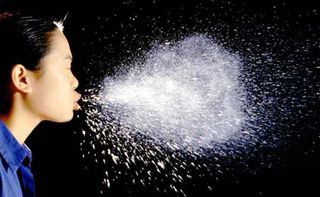
Why Do Some People Sneeze So Loudly?

It starts with a tickle in the nose. Something maybe a piece of dust or a speck of pollen irritates the mucous lining of the upper respiratory tract and sets nerve endings jangling. The nerves flash a signal to the most primitive part of the brain, the brainstem, which springs into action, commanding the lungs to inhale deeply. The vocal cords snap shut, the eyes close and air explodes out of the mouth and nose: ah-choo!
Or maybe it's more like: AH-CHOO!
The mechanics of a sneeze are the same for everyone, but what comes out when this reflex kicks in differs from person to person. What separates the dainty sneezers from the loud-and-proud types is likely a mixture of individual anatomy and personal control.
The output of a sneeze depends on factors such as lung capacity and the size of the pre-sneeze inhale. More air makes for a bigger sneeze.
Some people can control their sneeze volume, or dial back on the vocalizations. A 2006 survey found that 45 percent of people have public sneezes that are different than their private sneezes, according to a spokesperson for the allergy drug Benadryl.
For some, one sneeze isn't enough. These multiple, or "paroxysmal," sneezers sometimes have allergies , according to NetWellness, a non-profit health education organization. In rare cases, patients with epilepsy also exhibit protracted sneezing fits, but for most people, the number of sneezes is a personal tic or a response to a particularly stubborn speck of dust .
- Does Your Heart Really Stop When You Sneeze?
- Why Do My Eyes Close When I Sneeze?
- What Happens When an Astronaut Sneezes?
Got a question? Email it to Life's Little Mysteries and we'll try to answer it. Due to the volume of questions, we unfortunately can't reply individually, but we will publish answers to the most intriguing questions, so check back soon.
Sign up for the Live Science daily newsletter now
Get the world’s most fascinating discoveries delivered straight to your inbox.

Stephanie Pappas is a contributing writer for Live Science, covering topics ranging from geoscience to archaeology to the human brain and behavior. She was previously a senior writer for Live Science but is now a freelancer based in Denver, Colorado, and regularly contributes to Scientific American and The Monitor, the monthly magazine of the American Psychological Association. Stephanie received a bachelor's degree in psychology from the University of South Carolina and a graduate certificate in science communication from the University of California, Santa Cruz.
Most Popular



